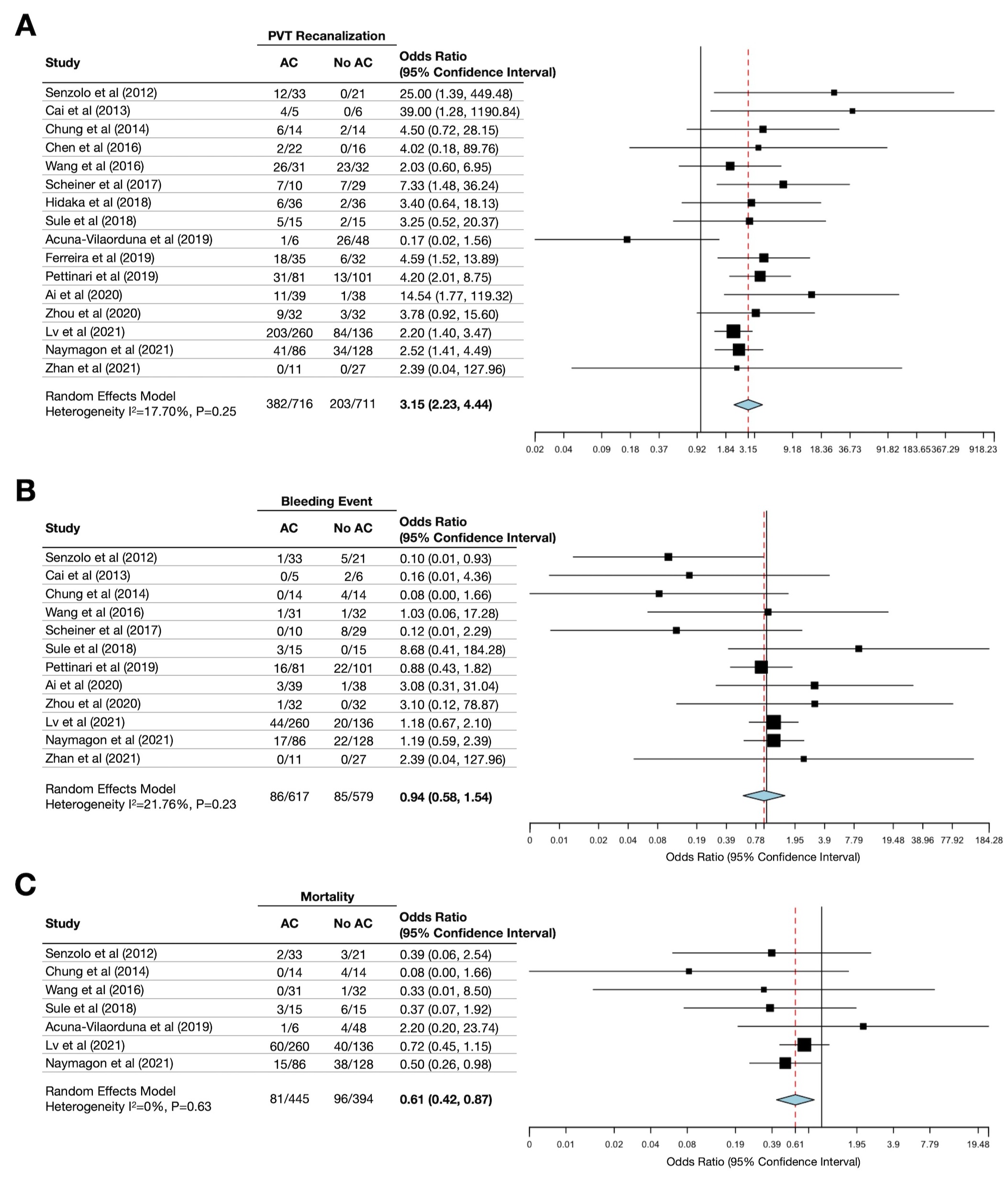Back
Oral Paper Presentation
Annual Scientific Meeting
Session: Plenary Session 2A - Liver / Pancreas-Biliary
19 - Anticoagulation for the Treatment of Portal Vein Thrombosis in Patients With Cirrhosis: A Systematic Review and Meta-Analysis
Tuesday, October 25, 2022
8:30 AM – 8:40 AM ET
Location: Hall C2

Calvin Yao, MS
David Geffen School of Medicine at UCLA
Los Angeles, CA
Presenting Author(s)
Calvin Yao, MS1, Matthew Y. Zhao, BS1, Brittney Ibrahim, 2, Sammy Saab, MD2
1David Geffen School of Medicine at UCLA, Los Angeles, CA; 2University of California Los Angeles, Los Angeles, CA
Introduction: Portal vein thrombosis (PVT) in the setting of cirrhosis leads to significant morbidity and mortality burden. Current consensus for anticoagulation use in PVT is primarily limited to symptomatic patients. An improved understanding of the utility of anticoagulation in patients with PVT will aid clinical decision making and inform future research. We performed a systematic review and meta-analysis on outcomes following anticoagulation for PVT in cirrhosis.
Methods: We searched Pubmed, Embase, and Web of Science from inception to February 13, 2022 for studies comparing the use of anticoagulation to other modalities as treatment for PVT in cirrhosis. Using a random-effects model, we calculated pooled odds ratios (OR) for PVT improvement, recanalization, progression, bleeding events, and all-cause mortality. Heterogeneity among the included studies was assessed using I2 statistics and Cochran Q test. Low heterogeneity was defined as I2 less than 50% and Cochran Q p value >0.10. In randomized controlled trials (RCT), the risk of bias was assessed using the Cochrane risk-of-bias tool for randomized trials (RoB2). In non-randomized studies, the risk of bias was assessed using the Risk of Bias in Non-randomized Studies – of Interventions (ROBINS-I) tool.
Results: Our literature search yielded 1,516 potential records, of which 572 duplicates were removed, resulting in 944 records for screening. 17 studies (n=1,478) examining anticoagulation as PVT treatment were included for analysis. Anticoagulation as PVT treatment was associated with PVT improvement (OR 3.53; 95% CI 2.54-4.89), PVT recanalization (OR 3.15; 95% CI 2.23-4.44), decreased PVT progression (OR 0.37; 95% CI 0.22-0.62), and decreased all-cause mortality (OR 0.61; 95% CI 0.42-0.87). Use of anticoagulation was not associated with bleeding events (OR 0.94; 95% CI 0.58-1.54). All outcomes revealed low heterogeneity.
Discussion: Results of our meta-analysis suggest anticoagulation is associated with PVT recanalization, lower rates of PVT progression, and improved survival. Furthermore, there does not appear to be an increased risk of bleeding events with anticoagulation when compared to management without anticoagulation. These findings provide evidence for the clinical utility of anticoagulation for PVT in patients with cirrhosis and may inform the development of modern clinical guidelines. This study also highlights the need for continued research on the use of anticoagulation for PVT in cirrhosis, with particular emphasis on large RCT.

Disclosures:
Calvin Yao, MS1, Matthew Y. Zhao, BS1, Brittney Ibrahim, 2, Sammy Saab, MD2, 19, Anticoagulation for the Treatment of Portal Vein Thrombosis in Patients With Cirrhosis: A Systematic Review and Meta-Analysis, ACG 2022 Annual Scientific Meeting Abstracts. Charlotte, NC: American College of Gastroenterology.
1David Geffen School of Medicine at UCLA, Los Angeles, CA; 2University of California Los Angeles, Los Angeles, CA
Introduction: Portal vein thrombosis (PVT) in the setting of cirrhosis leads to significant morbidity and mortality burden. Current consensus for anticoagulation use in PVT is primarily limited to symptomatic patients. An improved understanding of the utility of anticoagulation in patients with PVT will aid clinical decision making and inform future research. We performed a systematic review and meta-analysis on outcomes following anticoagulation for PVT in cirrhosis.
Methods: We searched Pubmed, Embase, and Web of Science from inception to February 13, 2022 for studies comparing the use of anticoagulation to other modalities as treatment for PVT in cirrhosis. Using a random-effects model, we calculated pooled odds ratios (OR) for PVT improvement, recanalization, progression, bleeding events, and all-cause mortality. Heterogeneity among the included studies was assessed using I2 statistics and Cochran Q test. Low heterogeneity was defined as I2 less than 50% and Cochran Q p value >0.10. In randomized controlled trials (RCT), the risk of bias was assessed using the Cochrane risk-of-bias tool for randomized trials (RoB2). In non-randomized studies, the risk of bias was assessed using the Risk of Bias in Non-randomized Studies – of Interventions (ROBINS-I) tool.
Results: Our literature search yielded 1,516 potential records, of which 572 duplicates were removed, resulting in 944 records for screening. 17 studies (n=1,478) examining anticoagulation as PVT treatment were included for analysis. Anticoagulation as PVT treatment was associated with PVT improvement (OR 3.53; 95% CI 2.54-4.89), PVT recanalization (OR 3.15; 95% CI 2.23-4.44), decreased PVT progression (OR 0.37; 95% CI 0.22-0.62), and decreased all-cause mortality (OR 0.61; 95% CI 0.42-0.87). Use of anticoagulation was not associated with bleeding events (OR 0.94; 95% CI 0.58-1.54). All outcomes revealed low heterogeneity.
Discussion: Results of our meta-analysis suggest anticoagulation is associated with PVT recanalization, lower rates of PVT progression, and improved survival. Furthermore, there does not appear to be an increased risk of bleeding events with anticoagulation when compared to management without anticoagulation. These findings provide evidence for the clinical utility of anticoagulation for PVT in patients with cirrhosis and may inform the development of modern clinical guidelines. This study also highlights the need for continued research on the use of anticoagulation for PVT in cirrhosis, with particular emphasis on large RCT.

Figure: Forest plots for rate of (A) portal vein thrombosis (PVT) recanalization, (B) bleeding events, and (C) all-cause mortality following use of anticoagulation as therapy for PVT in the setting of cirrhosis.
Disclosures:
Calvin Yao indicated no relevant financial relationships.
Matthew Zhao indicated no relevant financial relationships.
Brittney Ibrahim indicated no relevant financial relationships.
Sammy Saab indicated no relevant financial relationships.
Calvin Yao, MS1, Matthew Y. Zhao, BS1, Brittney Ibrahim, 2, Sammy Saab, MD2, 19, Anticoagulation for the Treatment of Portal Vein Thrombosis in Patients With Cirrhosis: A Systematic Review and Meta-Analysis, ACG 2022 Annual Scientific Meeting Abstracts. Charlotte, NC: American College of Gastroenterology.

